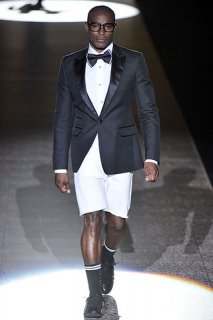At The Height Of Fashion, Black Models
Louise Vyent smiled from the cover of the February issue of Vogue. Two months earlier, Karen Alexander, another black model, appeared in profile on the cover of Elle magazine.
''Black models are starting to be used again,'' said Katie Ford, a vice president of Ford Models Inc. in Manhattan. Impelled by a group of newcomers, a renaissance is occurring for black models in the major women's fashion publications.
The first widespread use of black models occurred in the 1960's, in the wake of the civil rights movement. Black models were seen on the runways at fashion showings, too.
But then their popularity waned. ''In the early 70's black models were used a lot,'' Ms. Ford said. ''Then we went to a really low point.'' At that low point, only a handful of black models appeared regularly in magazines, among them Beverly Johnson and the Somalian model Iman.
Just why black models fell out of favor during the 70's is not entirely clear, though some said the 70's were a bad time for all models with dark hair or dark skin. Look of the 70's.
''In the 70's, it was a problem to go beyond the blond-haired blue-eyed girl,'' said Frances Grill, vice president of Click Model Management. ''The beauty of the 70's was, by and large, very fair-complexioned, until Brooke Shields and Isabella Rossellini came along.''
Today, newcomers like Kirsti Bowser, Gail O'Neill, Veronica Webb, Ms. Vyent and Ms. Alexander are appearing in Glamour, Elle, Mademoiselle and Vogue magazines and in many high-fashion advertisements.
Ms. Alexander, who is 21 years old and has been modeling for five years, said she thinks things are better now, though far from wonderful.
''I've not gotten Lancome offers every day - maybe they think we don't use makeup,'' she said.
Iman and Beverly Johnson ''had it worse,'' she acknowledged.
''They made it much easier for me,'' she said. ''They made people wake up and see that there are black models out there and that they are beautiful.''
Lacey Ford, another vice president of the Ford agency, said ''the world has finally opened up to a broader definition of what's beautiful.''
Dee Simmons-Edelstein of Grace Del Marco Modeling, which specializes in black models, said, ''We're at a stage when we can no longer deny that there is a black consumer.''
And the desire to attract black consumers means that ''most advertisers budget a certain amount of their dollars to the black market and the Latin market,'' said Bill Weinberg of Wilhelmina Models Inc. And that means more work for models from ethnic minorities.
While they are happy that black models are used more often, some in the modeling industry are critical of the form the renewal has taken.
''Today's black models are 'safe,' '' said Bethann Hardison, president of Bethann Model Management. ''They have white features. They're acceptable to the white eye.''
Ms. Grill, too, said that the most successful black models ''have physical attributes more in line with a white model.''
But believing that there are features that belong strictly to either whites or blacks is unfair, too, said Ms. Alexander.
''Black comes in all shapes, sizes and colors,'' she said. ''Everyone said it was so great to see a black model on the cover of Glamour when I did a cover for them about a year ago. I think there's discrimination among the black models who think that there are such things as typical black features, and that everything else is not really black.''
Nikki Garth-Taylor, beauty editor of Essence magazine, said that with the exception of a few at the top, most black models earn the bulk of their income from work for billboards and magazine advertisements. That branch of the business is not considered as prestigious as modeling for editorial fashion layouts, although it is far more lucrative. A Narrow Range.
Critics also said that the type of commercial modeling available to black models is limited. It is unlikely, Ms. Grill said, that a black model would be used in an ad for luxury cars, because ''black people are not thought of as affluent enough'' to afford such cars.
Ms. Garth-Taylor said the range of products black models are enlisted to endorse is narrow - limited, she said, to ''liquor, hair products and cigarettes.'' And blacks are used interchangeably with whites, Ms. Grill said, only if ''they're stars.''
At Mademoiselle, the models editor, Manuela Anzullag, estimated that the magazine has ''about five black models that we use - one or two in each issue.''
The determinant for the continued wide use of black models is how well the publications they appear in sell.
''It's all in the newsstands,'' said Monique Pillard, owner of Elite, a model agency. ''If there's a black on the cover and the circulation goes up, you better believe they're going to keep using more black girls.''


 .
.




